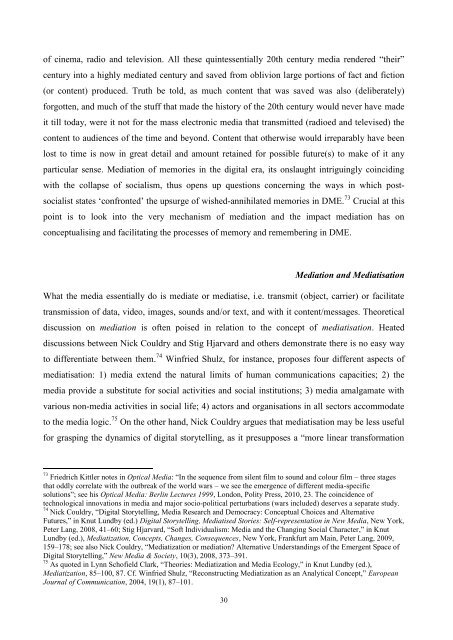UNIVERSITY OF NOVA GORICA GRADUATE SCHOOL ...
UNIVERSITY OF NOVA GORICA GRADUATE SCHOOL ...
UNIVERSITY OF NOVA GORICA GRADUATE SCHOOL ...
You also want an ePaper? Increase the reach of your titles
YUMPU automatically turns print PDFs into web optimized ePapers that Google loves.
of cinema, radio and television. All these quintessentially 20th century media rendered ―their‖<br />
century into a highly mediated century and saved from oblivion large portions of fact and fiction<br />
(or content) produced. Truth be told, as much content that was saved was also (deliberately)<br />
forgotten, and much of the stuff that made the history of the 20th century would never have made<br />
it till today, were it not for the mass electronic media that transmitted (radioed and televised) the<br />
content to audiences of the time and beyond. Content that otherwise would irreparably have been<br />
lost to time is now in great detail and amount retained for possible future(s) to make of it any<br />
particular sense. Mediation of memories in the digital era, its onslaught intriguingly coinciding<br />
with the collapse of socialism, thus opens up questions concerning the ways in which postsocialist<br />
states ‗confronted‘ the upsurge of wished-annihilated memories in DME. 73 Crucial at this<br />
point is to look into the very mechanism of mediation and the impact mediation has on<br />
conceptualising and facilitating the processes of memory and remembering in DME.<br />
Mediation and Mediatisation<br />
What the media essentially do is mediate or mediatise, i.e. transmit (object, carrier) or facilitate<br />
transmission of data, video, images, sounds and/or text, and with it content/messages. Theoretical<br />
discussion on mediation is often poised in relation to the concept of mediatisation. Heated<br />
discussions between Nick Couldry and Stig Hjarvard and others demonstrate there is no easy way<br />
to differentiate between them. 74 Winfried Shulz, for instance, proposes four different aspects of<br />
mediatisation: 1) media extend the natural limits of human communications capacities; 2) the<br />
media provide a substitute for social activities and social institutions; 3) media amalgamate with<br />
various non-media activities in social life; 4) actors and organisations in all sectors accommodate<br />
to the media logic. 75 On the other hand, Nick Couldry argues that mediatisation may be less useful<br />
for grasping the dynamics of digital storytelling, as it presupposes a ―more linear transformation<br />
73 Friedrich Kittler notes in Optical Media: ―In the sequence from silent film to sound and colour film – three stages<br />
that oddly correlate with the outbreak of the world wars – we see the emergence of different media-specific<br />
solutions‖; see his Optical Media: Berlin Lectures 1999, London, Polity Press, 2010, 23. The coincidence of<br />
technological innovations in media and major socio-political perturbations (wars included) deserves a separate study.<br />
74 Nick Couldry, ―Digital Storytelling, Media Research and Democracy: Conceptual Choices and Alternative<br />
Futures,‖ in Knut Lundby (ed.) Digital Storytelling, Mediatised Stories: Self-representation in New Media, New York,<br />
Peter Lang, 2008, 41–60; Stig Hjarvard, ―Soft Individualism: Media and the Changing Social Character,‖ in Knut<br />
Lundby (ed.), Mediatization, Concepts, Changes, Consequences, New York, Frankfurt am Main, Peter Lang, 2009,<br />
159–178; see also Nick Couldry, ―Mediatization or mediation? Alternative Understandings of the Emergent Space of<br />
Digital Storytelling,‖ New Media & Society, 10(3), 2008, 373–391.<br />
75 As quoted in Lynn Schofield Clark, ―Theories: Mediatization and Media Ecology,‖ in Knut Lundby (ed.),<br />
Mediatization, 85–100, 87. Cf. Winfried Shulz, ―Reconstructing Mediatization as an Analytical Concept,‖ European<br />
Journal of Communication, 2004, 19(1), 87–101.<br />
30

















